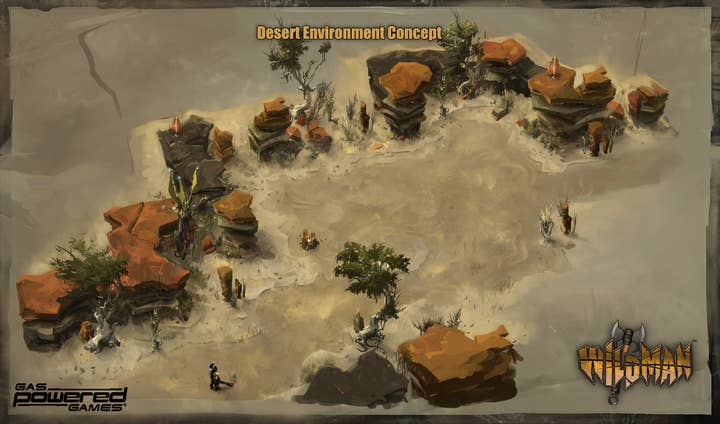Taking Back Control: How Kickstarter is Revolutionizing Development
Chris Taylor, designer of Dungeon Siege and Total Annihilation, tackles a new game and a new development model
Chris Taylor, the designer behind the Total Annihilation RTS and founder of Gas Powered Games (where he created Dungeon Siege) is ready to enter the new era of PC gaming. That's the Kickstarter era, as Taylor and Gas Powered Games begin their latest game project on Kickstarter rather than through a traditional publishing model. The new game, Wildman, combines the action RPG genre with RTS elements from a designer who's created famous examples of both genres.
GamesIndustry International spoke with Chris Taylor about his new game and the impact of Kickstarter on today's game designers. "I'm calling it a gaming revolution," said Taylor. "Evolution is when we can tweak or improve one of the elements in a system. Going to digital distribution is an evolution. When we have the walls come down, the state changes so dramatically, it's a revolution. It's a game-changer - pun intended. When I talked to Fergus Urquhart, he said 'You know, it's a revolution but in an opposite way; we're revolutionizing back to the way we were twenty-five years ago.' Twenty-five years ago, a bunch of guys got together and made a game. The business grew into something else; it became this complex system of money and contracts and distribution and it just gives you a big headache - what does this have to do with games?"
Taylor sees the Kickstarter revolution as a great way to build games. "To say it's our next big thing is absolutely true," Taylor said. "It's going to be a process. Take Minecraft as the ideal model; Markus works on it, he's all alone at first, he can only do so much. Then he releases it, he gets feedback, he shapes it, he molds it - he bootstraps up and the game evolves right in front of you. That is not at all like the way we used to make PC games."
"We see this incredible opportunity to work directly with our customers"
Taylor described the evolution of the process. "The very first PC game I released back in 1989 was Hardball II. I worked on it furiously for about a year and a half; we got it all debugged, put it in a box and sent it out there. Think of where we've evolved from such a beginning all the way to today, where we can have the community involved from the beginning. They can help us test it, they can provide us feedback, they can help us make tough decisions that we're struggling with."
Taylor noted some of the questions that developers have had to deal with. "Should we use DRM? Should we have an offline mode? Should we have PvP that does x, y, and z? Stuff that the developer has a hard time with. Over the last 25 years, it's been a publisher that's been the front line for a lot of those high-level decisions. Then the developer is given instruction from the publisher, and the developer follows their instructions and has to defend these things to the customer. That wasn't so bad twenty-five years ago because the customer couldn't talk to you."
"Today, the customer can talk to you, and you cannot say to them 'well, that wasn't a decision that we made.' You can't undercut what (essentially) your boss has told you. So you get into this really awkward three-way relationship with your customer. The publishers are generally tight-lipped. The developers are generally really talkative, but they can't talk to the issues that need to be spoken too. The customer goes, 'What's going on here? We don't understand; we're confused.' What a crazy business, and we've lived this."
The situation has changed now, Taylor feels. "Now we see this incredible opportunity to work directly with our customers. People think of Kickstarter as just a way to get money. We're like, 'No, no, that is a small part of it.' It's an important part, it's a pillar of it, but where it impacts how the game evolves, and how the game comes to be, how it's conceived, is in a completely different world. It's like praying for a miracle, and you get it. This is an amazing time, because finally we've got a direct route to our customer. We can listen to them , we can respond to them, we can have an honest, high-integrity relationship, be extremely transparent. They can carry some of our burden with us. They are happy to help; they're excited to participate. You can actually start putting things out in little bits and you can evolve it."

The analogy Taylor uses is that of constructing a building. "Let's think of a traditional AAA PC game as a ten-story building. You can make sure your foundation is solid, build the first floor of the building, and you can build each floor on top of it and this can take place over time. Each floor of the building can be customized to what the customer is asking for, instead of you conceiving of a building in your imagination and saying 'Here you go. By the way, sorry, these are condominiums, very little office space; sorry, but that's what we came up with.' And they go, 'No, you've got it all wrong, this is not the way we would have configured it.'"
Perhaps even more importantly, people can move into the first floor and start paying you rent before you build the whole thing. "Exactly. You can start generating revenue off the first floor, and that'll pay for the second floor."
Kickstarter turns around the fundamental economics of building games. "If you look at a game like Dungeon Siege, which took us four years to make and had 50 to 60 hours of game play, cost over $6 million (between 17 and 13 years ago, that space of time), you had such a leap of faith," said Taylor. "You're spanning over so many generations of technology, the risk in that model is astronomical. The risk in this other model just flattens. You look at the revenue generated; one fifth of the revenue generated at retail on a Dungeon Siege game went into the development. When you think about the dollars at the cash register making it into art, engineering and sound resources that are built... one fifth. When you look at the Kickstarter crowdfunding model, the percentage of the dollars spent by the customer that make it into the game is 90+ percent."
Wildman is an interesting hybrid of two genres: the RPG and the RTS. "It's an action RPG, and it doesn't take itself too seriously," said Taylor. "But we like some of the more mature themes that we want to bring to it." You play as a wild man, or as a wild woman. "The game name changes if you play a woman," noted Taylor. "The game screen changes to Wildwoman."
"One fifth of the revenue generated at retail on a Dungeon Siege game went into the development"
You control a single hero unit-the "Wildman"-in the middle of a raging battle between opposing forces in a specially designed War Zone. You engage the enemy and see your opponent switching tactics, forcing you to reconfigure your army to counter. You push the enemy back to their base before facing your opponent's champion. Over the course of this battle, you upgrade your armies with new technology, execute special abilities, construct defenses, change your army composition, and shape-shift into new forms that grant you new abilities.
Now imagine that between these War Zone battles you can go on role-playing adventures. You can explore fantastical environments. You can discover ancient dungeons full of mystery and treasure. You can earn new skills. You can discover and equip new weapons and armor. You can collect materials. You can craft new items. You can fight relentless onslaughts of men and monsters. This is also Wildman.
"Wildman takes the elements that we've crafted over the years with our action role-playing games and combines them with the things we love about real-time strategy," said Taylor. "It's original, it's unique and we think our fans will embrace this new approach. And if you like what you are seeing and hearing about the game, we hope you'll back us on Kickstarter."
The Kickstarter begins today, with a goal of raising $1.1 million to fund the development of the game.

